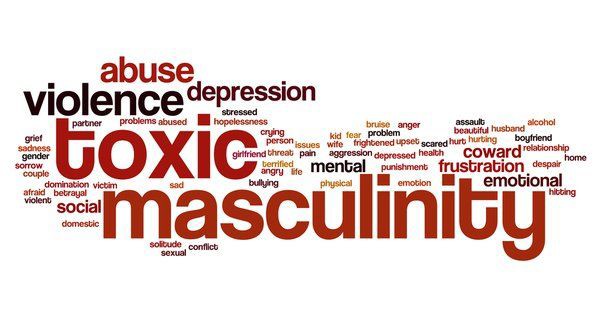I believe this wouldn’t be the first time you have come across the phrase “Toxic Masculinity.” What is Masculinity? Masculinity refers to attributes or characteristics society expects from the male gender. These are the social expectations that come with being a man or a boy.
Now, for something to be termed toxic – a word that is lightly thrown around in this day and age – it has to be harmful or poisonous. In a behavioral context, it’s a negative. It encourages the worst aspects of the stereotypical male: dominant, violent, emotionally unavailable, misogynistic, and sexually entitled lumps of intelligent meat.
In this article, we’ll be diving deep into the subject of toxic masculinity and exploring its different angles.
Watch this video, Toxic Masculinity: Why Men would rather die than speak out.
Table of Contents
Why Would Men Rather Die Than Speak Up?
From childhood, the male child is more often than not shamed for being sad or afraid. When a person is shamed for something, the humane response is to refrain from exhibiting those said traits. It is ingrained into men to suppress those feelings and move on, all because they happen to have a penis. You can sense a rigid, hard, and often emotionless shell forming from the constant shunning of these emotions that a child does not even understand how to process yet. Toxic masculinity begins to build up.
The stigmas against male vulnerability exist as a result of how men are raised. During childhood, the average male child is told not to cry when accidents happen, and his sexuality is questioned. Young men show emotions like pain, withdrawal, reclusion from society, or fear, and they get asked questions like, “Aren’t you a man?”.
From childhood all the way up to adulthood, men are unconsciously taught to downplay their struggles and mental health problems because of long-held stigmas that are deemed shameful to experience. When they do talk about it, they are laughed at, ridiculed, or their feelings are used as ammunition against them. If not us, then we know someone who has been shamed for having feelings that negate the “strong” male construct.
It’s all around us, from our friends to family, what we see on television to social media, and even sometimes the strangers we come across in our daily lives. The urge to keep silent about our internal struggles grows because the result of that “weakness” is unfortunately apparent almost everywhere we look. Dr Brene Brown, a renowned shame and vulnerability researcher and best-selling author, says, “Shame is the most powerful, master emotion.” It’s the fear that we’re not good enough.
For men, it’s the fear of not being wealthy enough, tough enough, or smart enough. The number one shame trigger for men is being perceived as weak. Men walk this tightrope where any sign of weakness elicits shame, and so they’re afraid to make themselves vulnerable for fear of looking weak.
The feeling of vulnerability when our true feelings are laid out for our audience and the unpredictability of their reactions makes it difficult, more so when society expects more of you than to feel anything. But if you can’t be vulnerable, then you can’t truly grow and be your best self. Women can either embrace and help men walk across the tightrope, or we can be the ones who push them off.
In general, toxic masculinity arises from age-long beliefs and perspectives about men which are passed down from generation to generation, but are not true. As discussed further in this video, the mindsets of our men have been so conditioned to these fallacies that they subconsciously act out these scripts without thinking.
Problems Arising From These Issues
This silence does come with a price. Since 2000, male suicide rates (which is four times higher than that of women) have risen steadily and are the 7th leading cause of death amongst men. Every year, millions are diagnosed with depression and anxiety disorder. There is alcohol dependency and substance abuse, especially among gay men, and there are twice as many male veterans who abuse alcohol and drugs as female veterans, regardless of their form of service.
This was written with help from a man who has seen these things happen and experienced it himself, and the responses are far from funny. Toxic masculinity is one of those worms, termites, that’s slowly and silently eating its way into the human community. We have left the age where violence and female domination are the order of the day, or so it seemed at first.
It is almost impossible with the new ways toxic masculinity is playing out to keep track of them all. Sure, the world cannot do without men, but we can definitely do without men policing women around, being misogynistic, entitled to everything because of their gender or downplaying the impact of women as kitchen workers, baby makers, and trophies.
It is imperative to create an environment and society where men feel comfortable expressing their emotions and encourage men to be less invested in gender roles. A society that does not shame its members for not conforming to an ill-conceived notion of what it means to be a man.
How to Identify Toxic Masculinity
-
Sexual aggression
A tell-tale sign of toxic masculinity is being overly aggressive or controlling when it comes to sex. Many men want to show how rough or tough they can be in bed. In situations where this comes into play, the man might want to hurry things up without caring how the woman is feeling. Solving this starts with communicating what you enjoy and don’t in sex.
-
Anti-feminist behavior
Especially on X (formerly known as Twitter), you see people who hurriedly downplay women’s achievements and are sometimes in a hurry to attribute monetary successes to another man. There’s always talk about, “Oh, she has an iPhone, she probably slept with someone to get it.” This and more downplay the idea of feminism and is a tell-tale sign of toxic masculinity.
Other signs of toxic masculinity are;
- Physical aggression
- Emotional unavailability
- Refusal to discuss problems about finances, fear, and career with a female partner.
- Undermining the competence of a female leader or boss at work.
- Sidelining a female in place of power and addressing her male counterpart
- Championing heterosexuality and being homophobic.
Suggestions for Tackling Toxic Masculinity
It is, again almost impossible to completely eradicate a problem, but it can be curbed. Toxic masculinity stems from misinformation in a way and as such, can be curbed in a number of ways:
- Enlighten men and young boys that it is okay to be vulnerable and show emotion first rather than bottling it up. Being cold, heartless, insensitive, and emotionally unavailable is the image of toxic masculinity, not of a real man.
- Provide means to elevate women’s experiences and roles in the business and career wavelength without making men feel threatened.
- There is a place of tolerating other parties, groups, and opinions without feeling attacked or shadowed. Women can own successful businesses without hindering the success of men in the same career. Same-sex marriages (although still illegal in Nigeria) can happen without limiting the chances men have to meet their spouses.
We have a thriving WhatsApp community where we share opportunities and resources that will be of help to you. Join us here.
Conclusion
Overall, curbing toxic masculinity starts with a mindset. The mindset that men are also humans, they are not more special than the women and they don’t have to prove what they are not. Also, as men, your opinions are not the only ones that matter. Your truths are not everyone’s truths, and your wishes and desires can be passed across without the presence of aggression.
Check out these related posts;
- 8 Signs You Are in a Toxic Workplace.
- Twitter: A Toxic Platform or Not.
- 8 Devastating Signs of a Toxic Relationship.
What’s your opinion about toxic masculinity? Let us know your thoughts in the comments section. Also, subscribe to our newsletter for updates on more insightful content.
Edited by Oluwanifemi Akintomide.
About Author
- Student of Philosophy||Writer||Baker|| Content Writer|| Student Journalist|| Video Creative. I love books, anime, and games.
Latest entries
 SpiceDecember 3, 2023Toxic Masculinity: Why Men Would Rather Die Than Speak Up
SpiceDecember 3, 2023Toxic Masculinity: Why Men Would Rather Die Than Speak Up

 CampusOctober 2, 2023Alumni Success Stories: Inspirational Stories of Nigerian Graduates
CampusOctober 2, 2023Alumni Success Stories: Inspirational Stories of Nigerian Graduates

